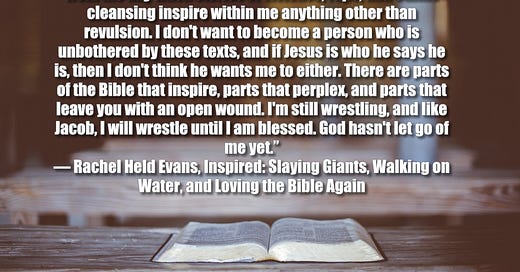Day 8: Making Sense of the Bible
#RethinkChurch is doing a 22-day journey for self-reflection based on John Wesley’s 22 questions. I will be trying to compose short blog posts addressing each question. I am using these posts to encourage Christians, especially Progressive and Mainline Christians to reflect deeply on what it means to be Church in a world marred by oppression and violence.
Day 8: Do I give it (the Bible) time to speak to me every day?
“The Bible is a human product: it tells us how our religious ancestors saw things, not how God sees things.”
― Marcus J. Borg, Convictions: How I Learned What Matters Most
I will be honest, when it comes to reading the Bible daily, I am the worst. That is something that I am slowly working on, taking time out of each day to read the Bible and wrestle with it.
One of the hardest things I had to do after I first left Fundamentalist Christianity was learn to love the Bible again without turning it into an object that must be taken literally and which is never wrong. The Bible, as I’ve mentioned in past posts is a complicated text. Not only because it is a text written and compiled over thousands of years and as such it is subject to numerous interpretations but also because when you actually read the Bible without an apologetic framework and not through an inerrancy lens you begin to fully see all the messiness and contradictions within Scripture.
I knew there were contradictions while I was still a part of Fundamentalist Christianity but because Biblical inerrancy and literalism was a key part of Fundamentalism, I immediately found ways to explain away the contradictions or to justify horrific verses that discuss tearing people to pieces or that seemed to endorse anti-Judaism/ anti-Semitism. But letting go of Biblical inerrancy meant that I could see the contradictions and messiness of the Biblical text fully. And when I say the messiness and contradictions-I mean of both the Hebrew Bible and the New Testament.
There’s a tendency by some Christians to view the Hebrew Bible (or Old Testament) as uniquely violent and to just focus on how supposedly loving and peaceful the New Testament is even though Jesus extensively quoted form a version of what we now call the Hebrew Bible. Plus some of the most memorable teachings Jesus had about loving God and others didn’t just materialize out of nowhere, but have a basis in the Hebrew Bible. Moreover, the New Testament isn’t a bastion of feel good stories- there are verses from the New Testament that have been interpreted as endorsing the subjugation of women and condemning the LGBTQ+.
Anyway, the Bible is complicated, ya’ll. And when I let go of Biblical inerrancy, I needed to find a way to learn to love the Bible again. To value it but also to argue with it, challenge it, and yes, even say, “the version of God presented in this story or verse is not a God that I want to worship.”
I’ve had to learn how to “wrestle” with the Biblical text and allow it to challenge my view of God. I’ve had to honestly admit that there are some verses and stories in the Bible that are horrific and disturbing. But there are also verses that proclaim a God that journeys with us through life and that advocates no demands justice and an end to oppression.
It’s a delicate dance. No longer do I view the Bible as a guidebook that if I interpret correctly can unveil the mysteries of life. No longer do I view it as a weapon to prove that my religion, my form of Christianity is “correct.” Instead I view it as a living, fluid text that needs to be carefully sifted through. I view it as a text where God’s voice needs to be searched for. God's is not evident in every story or every verse. I view it as a text that tells us more about humanity’s understanding of God than it does about God itself. The Bible provides just a glimpse of God. And sometimes the writers get it wrong. Just like today, the writers and compilers of the Bible present God in ways that justify their own prejudices and viciousness. But there are also attempts at presenting God in ways that transcend humanity’s hatefulness.
The Bible can teach us a lot, not only about God but also about ourselves.
Day 1: Illusions of Perfection
Day 2: The Dangers of Embellishment
Day 3: Loose Lips Sink Ships or Silence Kills?
Day 5: The Oppression of Professionalism



